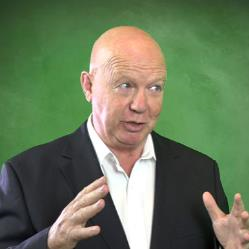
"How can I achieve a more reliable forecast?" - Interview by John Smibert
In this conversation Tony Bonanno emphasises the things a sales manager should focus on in order to achieve a more accurate forecast. He talks about how too many sales managers assess and measure the wrong indicators and as a result their forecast is less than accurate.
 Tony explains that many sales managers tend to manage lagging indicators. So, a sales deal is near to being won or lost, and they manage that and question their salespeople in that context. "Why haven't we done this? Why are we going to win it, or why are we going to lose it?". This is all too late to achieve a good understanding of the chances of closing the business in the ensuing time-frame.
Tony explains that many sales managers tend to manage lagging indicators. So, a sales deal is near to being won or lost, and they manage that and question their salespeople in that context. "Why haven't we done this? Why are we going to win it, or why are we going to lose it?". This is all too late to achieve a good understanding of the chances of closing the business in the ensuing time-frame.
Tony then emphasises that we need to manage leading indicators - to extract insight from the salesperson as to what is happening in the earlier stages of the sales process - and coach the salesperson on these. Aside from strong skills development by the salesperson this also leads to a much better understanding of the status and standing of the deal. When it gets closer to commitment we are in a better position to forecast more accurately.
"The bottom line of that is that it allows a sales manager to do what they're supposed to do, which is manage the people who manage the sales process, rather than get too hands on and be managing the sales process themselves".
See the interview below to see his recommendations.
Tony Bonnano is a thought leader in sales management, sales growth and behavioural change
See more of the 'TALKING SALES' series here
Interview
John: Hello, I'm with Tony Bonanno again! Welcome back, Tony!
Tony: It's my pleasure, John - thank you!
John: Hey Tony, I talk to sales managers a lot, and one of the biggest issues they talk to me about is not hitting their forecast. Their management is on their hammer, and they really work hard and work with all their salespeople to come up with a forecast every month and every quarter, and then they miss it. And, of course, that's one key thing that executive management see as a problem. Have you got ideas that would help sales managers to learn how to do a better forecast, to be more accurate and actually deliver to what they forecast?
Tony: I think where we have to start is to look at what many sales managers do when they're managing their forecast right now. Certainly some of the ones that I've come across who are struggling, tend to manage lagging indicators. So, a deal is lost, or it's near to being lost, and they're managing that. "Why haven't we done this? Why did we lose it, or why are we going to lose it?"
John: And it's important to ask those questions;we're going to have to learn from that.
Tony: Absolutely. But, when we talk about tend to manage lagging indicators. So, a deal is lost, or it's near to being lost, and they're managing that. "Why haven't we done this? Why did we lose it, or why are we going to lose it?", things that are going to happen early in the deal cycle, in the sales cycle... For example, there are two key decision makers, and the salesperson has not yet had a face to face conversation with either of them... That's a leading indicator that says that there's a deal at risk.
John: It certainly is - absolutely.
Tony: So, they need to manage that. And what that allows them to do is to be able to coach in context what's happening in that deal for that salesperson, and give them guidance and send them down on the right path.
John: So, you're saying if the sales manager is continually focused with the salespeople, from a coaching point of view, on the leading indicators early in the sales cycle, he's going to have a much better chance of hitting his forecast.
Tony: Yes, and be able to control the processes that happen after each of the segments, by giving direction or allowing the salesperson to learn from that coaching session. "I get it, this is what I have to do. I've got to go and schedule meetings with these decision makers." and they get agreement on when it's going to happen, and report back.
John: Actually, that made me think. Probably the best sales manager that I ever knew was a lady by the name of Meredith, and she was absolutely brilliant. She used to spend a lot of time with each individual salesperson, and be talking to them all day every day, and ask them how they're going, etc., and she'd be focused on what you're calling leading indicators. She had known well before we were getting to this stage where we only had a couple of months to go in a deal, whether they had a good chance of winning it or not, and coaching the salesperson through that process. So, that's what you mean.
Tony: That's right. And the bottom line of that is that it allows a sales manager to do what they're supposed to do, which is manage the people who manage the sales process, rather than get too hands on and be managing the sales process themselves, and not leveraging the number of people they've got in their team to do the job.
John: Yeah - being a manager, and not a leader and coach.
Tony: Absolutely.
John: Okay, got it. Good points - thanks very much, Tony!
Tony: Perfect!
****************
More interviews with Tony Bonanno:
***************

Your Invitation: I invite you to join the Sales Leader Forum group on LinkedIn where you can experience informative discussions with your peers and sales thought leaders on subjects like the one we have discussed here. I also invite you to subscribe to the
- Sales Leader Resource Centre here
- Sales Leader YouTube channel here (300+ sales leadership videos)
Please Share: If you valued this article, please share via your Twitter, LinkedIn, Google+ and Facebook social media platforms. I encourage you to join the conversation or ask questions. So feel free to add a comment on this post - I promise to respond. If inclined please follow my LinkedIn post page here.
Want to touch base? If you have questions please feel free to contact me - email: john.smibert(at)salesleaderforums.com, Phone: +61 404857893 or Skype: john.smibert